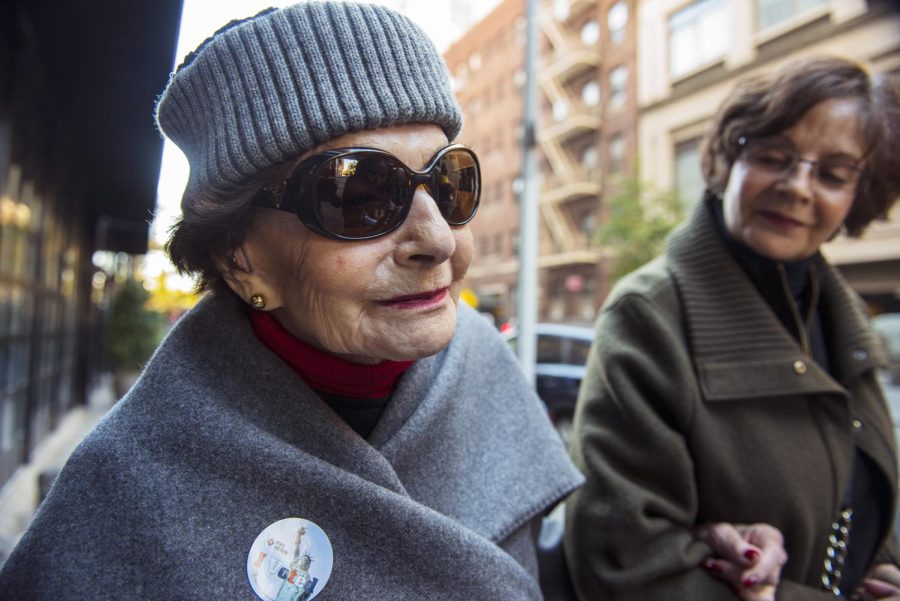New York City: Looking beyond the election’s candidates
November 8, 2016
With a matter of hours until the 45th president of the United States is announced, KentWired sent reporters to New York to cover each presidential nominee watch party and the crowds that come to celebrate.
High above the heads of the thousands milling around New York City’s Times Square, a jumbo screen flashed red and blue. The presidential nominees’ faces came on screen, followed by the word “vote” written in bold white. City residents and tourists filled the square, interspersed on either sides of the stop-and-go traffic. The latter stared in awe at the skyscrapers towering over them. Natives shuffled past, uninterested in the advertisement flashing like warning sign.
It was Monday; the eve of Election Day.
Two women sporting bright red noses stood in the thick of it all. Their red shirts and printed pants were vivid contrasts to the black and gray coats passing by. One of the women, resident Barbara Ann Michaels, held a white cardboard-cutout picture frame with ‘President’ and ‘I Vote 4 U’ written in bold black on the top and bottom. As pedestrians passed through the open area, the women asked them one question:
“What do you want to be the president of?”
“I just think that If we can share a moment of happiness with a complete stranger, then they’ll take that on to the next person they meet, and so on,” she said. “It makes a difference, even if it’s just a moment.”
Michaels and her co-worker, Brooklyn resident Kelsey Riker, spent the better part of the evening offering people the chance to become the president of anything they wanted. They passed out red, white and blue stickers with fill-in-the-blank spaces for a name and whatever a person desired to be the president of. To complete their project, Michaels took a photo of the person in the cutout picture frame, and posted it to the project’s Instagram account.
“I like to do topical projects like this,” Michaels said. “I just really believe that when strangers feel safe to talk to each other and connect, then the world feels safer. When people feel worried and concerned about connecting with strangers, then the world feels less safe.”
Michaels has spent one day a week in NYC for the last four months giving strangers the opportunity to “be seen, celebrated and connected with each other.” She plans on being out all day Tuesday.
The project isn’t about this year’s election. It’s not about the candidates. On the surface, it’s simply an opportunity for people to be “the president of whatever they want to be,” Michaels said. But its true purpose, she said, is to give everyone a chance to celebrate their freedom of expression right on the streets of NYC.
“It feels good to have somebody say ‘I vote for you.’ Some people don’t believe it, and then we just make their day,” Michaels said. “I like to say we’re getting out the vote by giving the vote.”
River said the project isn’t your typical social experiment. “It’s very typical and a-typical,” she said, “because it’s not like anything else that’s being down here.”
Fifteen-year-old Deshaun Harrison stood near the women as they asked passersby what they wanted to be the president of. Coming from Manhattan Center High School, where he’s currently a sophomore, he clutched the backpack strapped to his back tightly as pedestrians brushed by.
He doesn’t pay much attention to the “political stuff” that’s taken over the news and billboards throughout the city. “It’s here all the time, so I guess I just see it as a part of an everyday thing now,” he said.
Harrison can’t vote on Tuesday, but — like the project’s purpose — Harrison doesn’t think much of the candidates to begin with: He doesn’t like either of them.
“Even if I could vote, either way I’d be voting for somebody I don’t want to be president,” he said. “I know the election is important, and it’s going to affect me somehow. I don’t know how, but I know it will.”
Alex Delaney-Gesing is a senior reporter, contact her at [email protected].

























